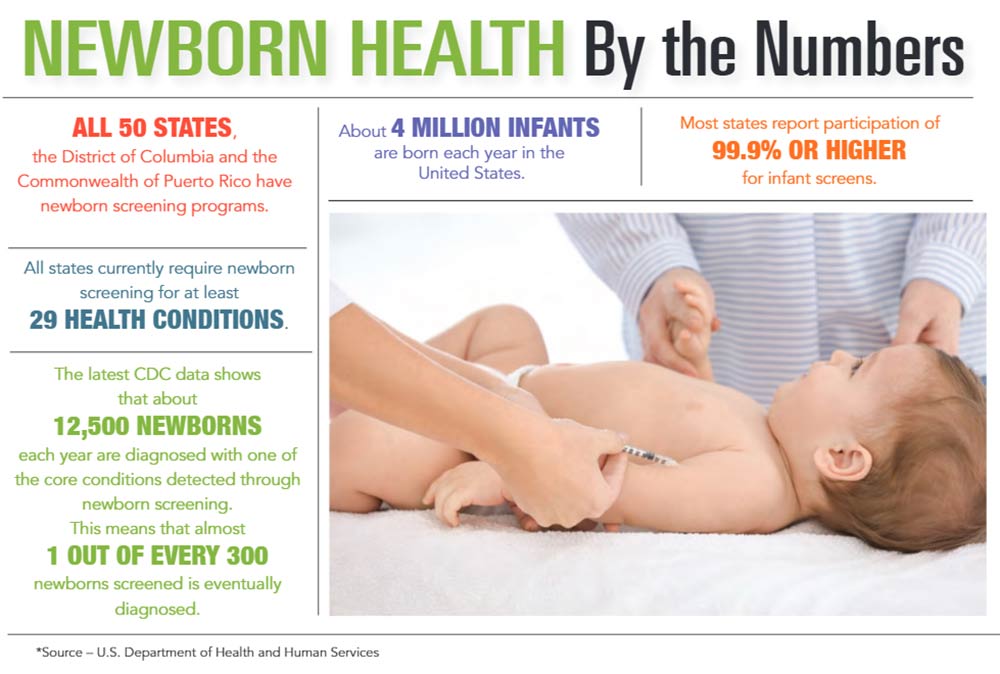Baby health screenings during pregnancy and the first few months after birth help keep infants healthy and best prepare their parents to care for them.
A new baby is nothing short of a miracle – especially if you think of all the different elements that must develop and grow properly to form a complex human being.
Of course, during pregnancy and the newborn stages – important times that can reveal so much about the baby’s health – it’s normal for parents to worry. Luckily, technology these days can offer parents peace of mind and reassurance that everything is going well and a window of time to prepare should anything not be developing normally.
Screenings During Pregnancy
There’s a difference between a screening, which can show if a mother or baby is at a higher risk of developing a problem, and a diagnostic test that actually confirms that there is a problem, explained Dr. Alex Shurling, an obstetrician at Greenwood OB-GYN.
“We recommend every single person gets an ultrasound during their pregnancies,” said Dr. Shurling. “That’s just the standard of care. Beyond that, it kind of depends on how much a parent wants to be prepared if something is going on or assured that everything is fine.”
Most of the screenings available to pregnant moms are for the first or second trimester to look for markers for conditions such as Down syndrome, trisomy 18 or spina bifida. These screenings are not diagnostic but would mean that further testing might be necessary to diagnose an issue or condition.
A blood draw as early as 10 weeks into the pregnancy known as the noninvasive pregnancy screening can examine a baby’s chromosomes by looking at the mother’s blood. It can tell the sex of the baby and detect any major chromosomal abnormalities.
“That’s what we recommend for all pregnancies, especially if they are at high risk,” said Dr. Shurling.
Some factors can put pregnancies into a higher risk category than others. Mothers might want to get additional screenings if they are at an advanced maternal age, suffer from abnormalities such as diabetes or have an elevated risk of inherited disorders. Those who are low risk may choose not to have any early screenings beyond an anatomy scan, which is performed in an ultrasound.
Screenings for Newborn Babies and The First Visit to the Pediatrician
Once a baby is born, doctors can tell more about how healthy the child is and can identify any risk factors. The first hours after birth are crucial, so newborns are monitored frequently. Most hospitals screen them 24 hours after birth for congenital heart disease, jaundice levels and hearing, and complete a newborn metabolic screen, a test that checks whether babies can break down their food or absorb nutrients.
“Most screenings are designated so that a positive screening with intervention will prevent further complications,” said Dr. Colleen Boylston of Sweetgrass Pediatrics in the Charleston area. “For instance, a failed newborn hearing screen will allow early intervention to help with language development.”
After babies are discharged from the hospital, they begin seeing a pediatrician to ensure that they are off to a good start. That first visit is also so that the baby’s parents can get to know their child’s pediatrician and get acquainted with office staff.
Since newborn babies sometimes have difficulty with breastfeeding or bottle feeding, doctors also check to make sure the baby is gaining weight normally and producing plenty of wet and dirty diapers, too.
“Feeding and sleeping patterns are important in growth and development,” Dr. Boylston explained. “Developmental skills and ‘what to expect’ in the upcoming months is usually discussed, as well and the recommended immunizations.“
Of course, parents also have the opportunity to discuss any concerns. Sometimes asking a simple question can put their mind at ease.
“Parents should always watch for anything out of the ordinary,” said Dr. Boylston. “Many times these changes are normal, but it is always great to check with your pediatrician’s office.”
Vaccination Schedule
According to the Centers for Disease Control and Prevention: “Vaccinations throughout childhood are essential because they help provide immunity before children are exposed to potentially life-threatening diseases.”
The CDC recommends that babies get their first hepatitis B shot at the hospital when they’re born. At their two-month pediatrician appointment, they are due for a few more vaccinations, including DTaP (diphtheria, tetanus, acellular pertussis), Hib (haemophilus influenzae type b), IPV (polio), PCV (pneumococcal conjugate vaccine) and RV (rotavirus). The baby will get mostly booster shots at 4 months and 6 months. MMR (measles, mumps and rubella), VAR (varicella) and a seasonal flu shot will round out the baby’s first year.
By Erica Rodefer Winters








